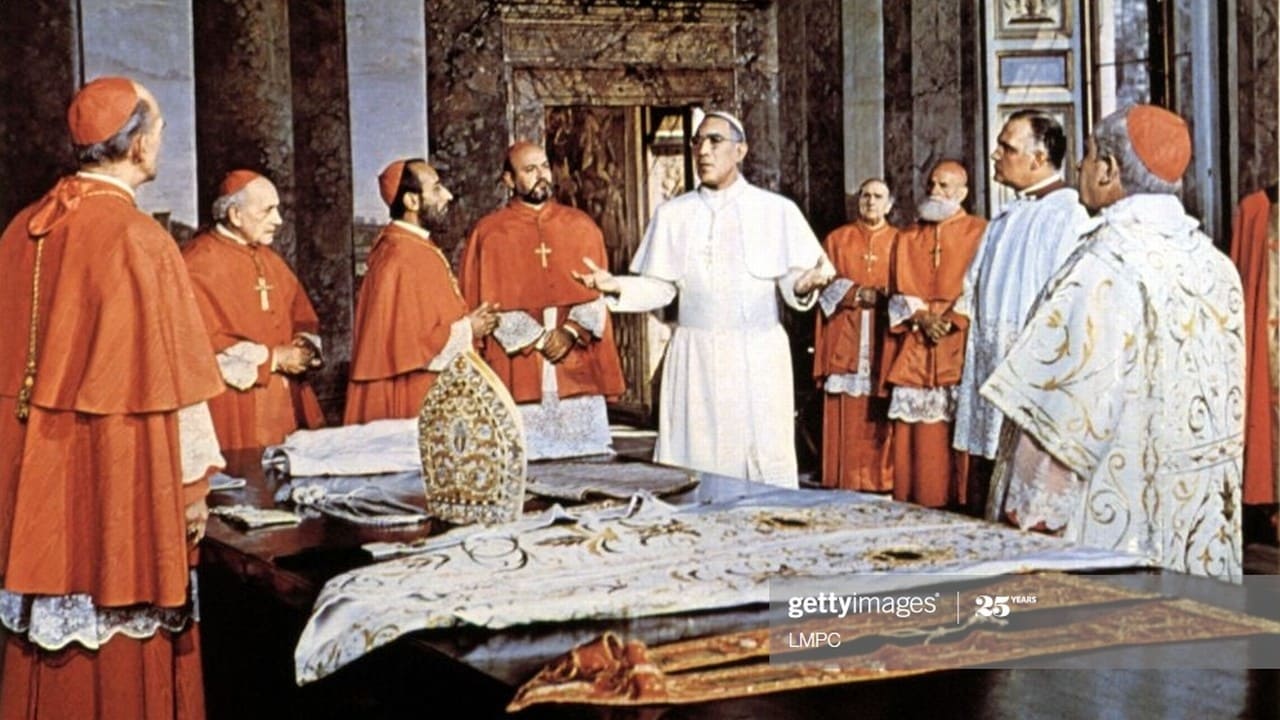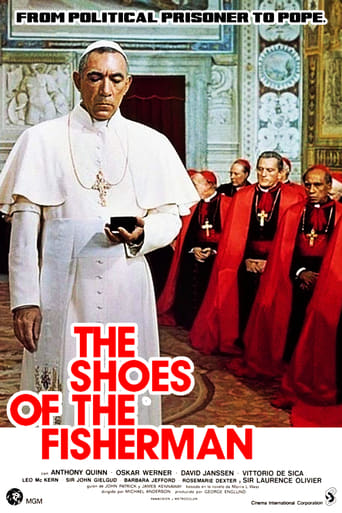

From my favorite movies..
... View Moreit is the rare 'crazy' movie that actually has something to say.
... View MoreThe movie turns out to be a little better than the average. Starting from a romantic formula often seen in the cinema, it ends in the most predictable (and somewhat bland) way.
... View MoreYes, absolutely, there is fun to be had, as well as many, many things to go boom, all amid an atmospheric urban jungle.
... View MoreI have a feeling that in 1968, this movie was a major deal. The Shoes of the Fisherman showed the intimate, intricate process of selecting a new pope after the current one's death, and it included real footage of the coronation ceremony while splicing in footage of a properly bedecked Anthony Quinn. Devout Catholics who have an interest in the process and ceremony will probably be very interested in this movie. Modern audiences who maybe aren't as serious about the religion will find it, as I did, incredibly boring.The plot synopsis reveals Anthony Quinn has been released after spending decades in a POW camp, but he doesn't act like he's been through anything more difficult than remembering his lines. Normally, I think he's a brilliant actor, but he must have been angry at the director because he wasn't nearly as good as he could have been. You would think, playing a character who's endured years of imprisonment, he'd have an underlying pain behind his eyes. You would think, playing a character who's up for consideration to become the new pope, would have a multitude of expressions at his disposal, rather than just one that says, "I'm cold and I'm sad about it." Whatever Tony was trying to do didn't come across.John Gielgud plays the pope, of course, but as he often did during his later years, he acts like he's enormously bored and would rather be somewhere else. Laurence Olivier plays a Russian bigwig, but even his biggest fans will admit he isn't always the best at accents. Speaking of accents, for the first half of the film, I didn't know what kind of accent Anthony Quinn was putting on. At first I thought he was Italian, then Russian, then Spanish, then Transylvanian. By the time I was convinced he came from the land of Count Dracula, another character in the movie informed the audience he was supposed to be Ukrainian.David Janssen takes up a good third of the movie, and this third could have easily been cut. He plays an adulterer and a reporter. His scenes are pointless, irritating, and boring. Oskar Werner plays a priest with religious doubts, but the scenes they gave him to express his opinions and spark an interesting debate were both watered down and intentionally confusing, maybe so the audience would tune out and not pay attention to this part of the story.As you can tell, I didn't like this movie. I appreciated the detail included with regards to the election process, but as far as the dialogue and acting, I wasn't impressed. Catholic moviegoers might want to check out The Thorn Birds instead.
... View MoreI am a man of faith but not Catholic. I appreciated the taste with with faith and Catholicism were portrayed in the movie. Not a perfect movie and it can appear dated at times. However it does have some plot twists, makes you think and reminds you of the hope and humanity of the human race.Quinn does an excellent job portraying the conflict he faces. The supporting cast plays their wells true. Some of the premises and solutions might be far fetched but the plot does a great job of portraying the agony and subsequent growth one goes through as he or she is faced with difficult life changing decisions.
... View MoreAlmost semi-documentary like in its telling of the processes of electing a new pope, "The Shoes of the Fisherman" is more of a message to the wealthy Catholic church than an actual movie. Told in just over 2 1/2 hours, the film starts with Russian Bishop Anthony Quinn being released from captivity in Siberia after 20 years, and his appointment to a cardinal-ship in Rome by Pope Sir John Gielgud. No sooner has Quinn stepped into his cardinal robes than the Pope has passed away, and the viewer gets an in-depth look at the process of replacing him. It soon becomes clear that the cardinals are not in agreement of who should be pope, and when Quinn simply expresses his simple values of world peace and solving hunger issues in Communist China (which has the world on the verge of another war), he suddenly finds himself getting votes from supportive Cardinals. Elected pope against his will, Quinn soon learns some harsh secrets about being in such a position of power, especially that it is a very lonely life. Like Zorba the Greek, Quinn's Russian Pope wants to see as much of the world as he can to understand it, and he disguises himself (like Audrey Hepburn in "Roman Holiday") as a common man to see it. He runs into the troubled wife of an American reporter (whose infidelity had earlier been revealed), and helps her solve her crisis while she takes care of a Jewish patient. Back in the Vatican, the Pope finds out about resentments from Cardinal Leo McKern (giving a bravo performance) over Quinn's liking for a troubled young priest, and learns of what he must do to survive this lonely life. What comes at the end is very touching, and even quite important in the current state of affairs.Quinn, as usual, gives an honest performance that reveals this character's humanity. He is quite likable from the start, and it is very apparent that such a pope (wearing civilian clothes when he goes off on Vatican business) could never exist, even in post Vatican II society. The problem is that this is a 2 1/2 hour character drama with no real conflict, just a series of situations revealed he must face when chosen pope. If there was more development in the story of a possible third World War which needed the church's interference, I could give this a much higher rating. It is beautifully filmed, and features a nice supporting performance by Sir Laurence Olivier as the Russian official who has Quinn released, and later meets with him to discuss the possibility of war and the resolution of world wide famine. I highly recommend it, but not without reiterating that it feels somewhat incomplete. In spite of its long running time, the film is not boring at all, and actually seems to move quite fast in spite of the lack of a story.
... View MoreWell, for me, "Shoes of the Fisherman" is a science fiction movie about the future of the Roman Catholic Church. I believe the big question posed by the movie is this "What if a Marxist left wing socialist is elected Pope of the Roman Catholic Church? How would that church react to a pope with a agenda like that? How would the world react?" Despite the fact that the future pope, archbishop Lakota (Anthony Quinn) is locked away and tortured in a Soviet Prison Camp for 20 years, His actions and statements shows his preference for Socialism. For instance, at one point, he mentions his violent advocacy of a Socialist sounding "Authentic Christian Revolution with work for all, bread for all, dignity for all men". At the beginning of the film, Kiril rejects the medieval structure of the Roman Catholic Church, where he rejects being a "Prince" of the church because he wants a mission to be with "simple men". At another point of the film, Lakota goes "AWOL" and decides to be a regular "working man's" priest, ditches his "Pope" stuff and hangs out with the "people". At another point in the film, Lakota confesses to Father Telemond (another fellow Radical) about his guilt in being a "Prince" while regular people starve. And at the end, our "Socialist" Pope gives away all the wealth of the church to help the suffering.
... View More